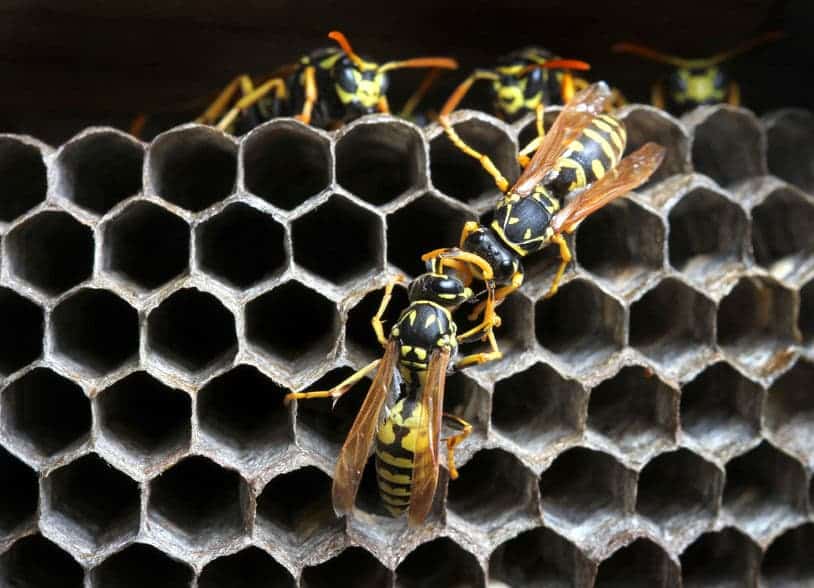Bee? Wasp? Ah, they’re the same thing. But are they really the same? Honeybees and wasps both belong to the insect order Hymenoptera, and according to the Encyclopedia Britannica, the Hymenoptera order is quite extensive, encompassing over 115,000 insect species. This includes bees and wasps, as well as ants, sawflies, ichneumons (a type of wasp), chalcids (another type of wasp), and many more.

Despite being in the same scientific order, bees and wasps differ significantly when it comes to pest control as well as behavior.
At Turner Pest Control, we don’t offer control services for honeybees. They are vital for pollinating plants, which supports food production and biodiversity. They help maintain ecosystems by enabling plant reproduction and providing food for other species. Protecting bees is essential for a healthy environment.
However, we do provide expert services to address issues with wasps, other types of bees, and stinging insects on your property.
Wasps in the Sunshine State
According to the University of Florida, the wasps found in our wonderful state include:
- Cicada killer: This solitary wasp operates alone, though colonies may nest together, with each pregnant female digging her own hole. They place an egg in the hole along with a paralyzed cicada for their offspring’s food. A similar species uses flies for this purpose. These wasps are black with pale yellow markings on their abdomen.
- Mud dauber wasp: These non-social wasps build their nests out of mud near humans. Fortunately, they are not very aggressive and rarely sting people. They feed paralyzed spiders to their young.
- Paper wasp: These aggressive wasps often sting people, especially when their nests are disturbed, or shrubs are trimmed. They come in varieties that are yellow with brown markings or black with yellow or red markings.
Bees in Florida
Many bee species in our state are beneficial. Local types of bees include:
- Honeybees: These bees are vital pollinators, crucial for agriculture and our food supply. A honeybee dies after one sting.
- Bumble bees: They also play an essential role in agriculture, but their stings can be more severe.
- Carpenter bees: Often confused with bumble bees, the larger variety nests in logs, stumps, and tree branches, while the smaller variety may dig tunnels in bush stems. They are not a significant stinging concern but can damage your home’s structure.
- Africanized honeybee: Unfortunately, this aggressive bee can be dangerous to young people, those with disabilities, and the elderly—anyone who can’t escape quickly. They nest near people and can be easily antagonized.
- Yellow jackets: Both the eastern and southern varieties can become agitated easily and sting repeatedly. They are often found near trash cans, dumpsters, and soda cans. On the plus side, they eat insects that can harm your landscaping.
Removing the Sting from Your Life
If you need to remove wasp nests near your home or have other issues with wasps, it’s best to call in professionals. We offer free, no-obligation estimates on our pest control services, including wasp control.
Keeping Stinging Insects at Bay
If you don’t currently have a problem with bees or wasps, taking proactive steps to keep them away can be beneficial. Common household items can help deter them. For example, they dislike the smell of dryer sheets, which you can place around areas where you plan to eat outdoors. They also hate the odor of mothballs, which you can tie up in cheesecloth and place nearby. Another scent they dislike is cloves.
After eating outside or feeding pets, remove anything that might attract insects. Keep trash cans tightly sealed, clean up soda spills and sugary crumbs, and check for gaps in your home’s siding or paneling that could make ideal wasp nests. Bees may be drawn to piles of decaying leaves or dry wood, so keep these materials away from your home. Store flowerpots and empty buckets indoors and eliminate places that might attract bees. While bees are naturally attracted to flowers, avoid planting them too close to your home.
To keep bees and wasps out of your Florida home, seal any holes you find and weatherstrip cracks and crevices around windows and doors.
Turner Pest Control: For When You Need Help
DIY methods to eliminate stinging insects are not always effective and can be dangerous, especially if someone on your property is allergic to stings. For your safety, let our experienced pest control technicians at Turner Pest Control handle the problem. Our Free online inspection form is the BEEginning of a sting free home.
